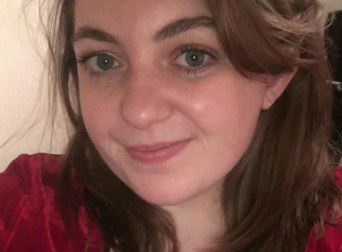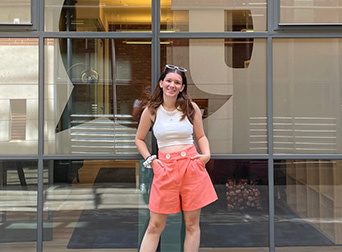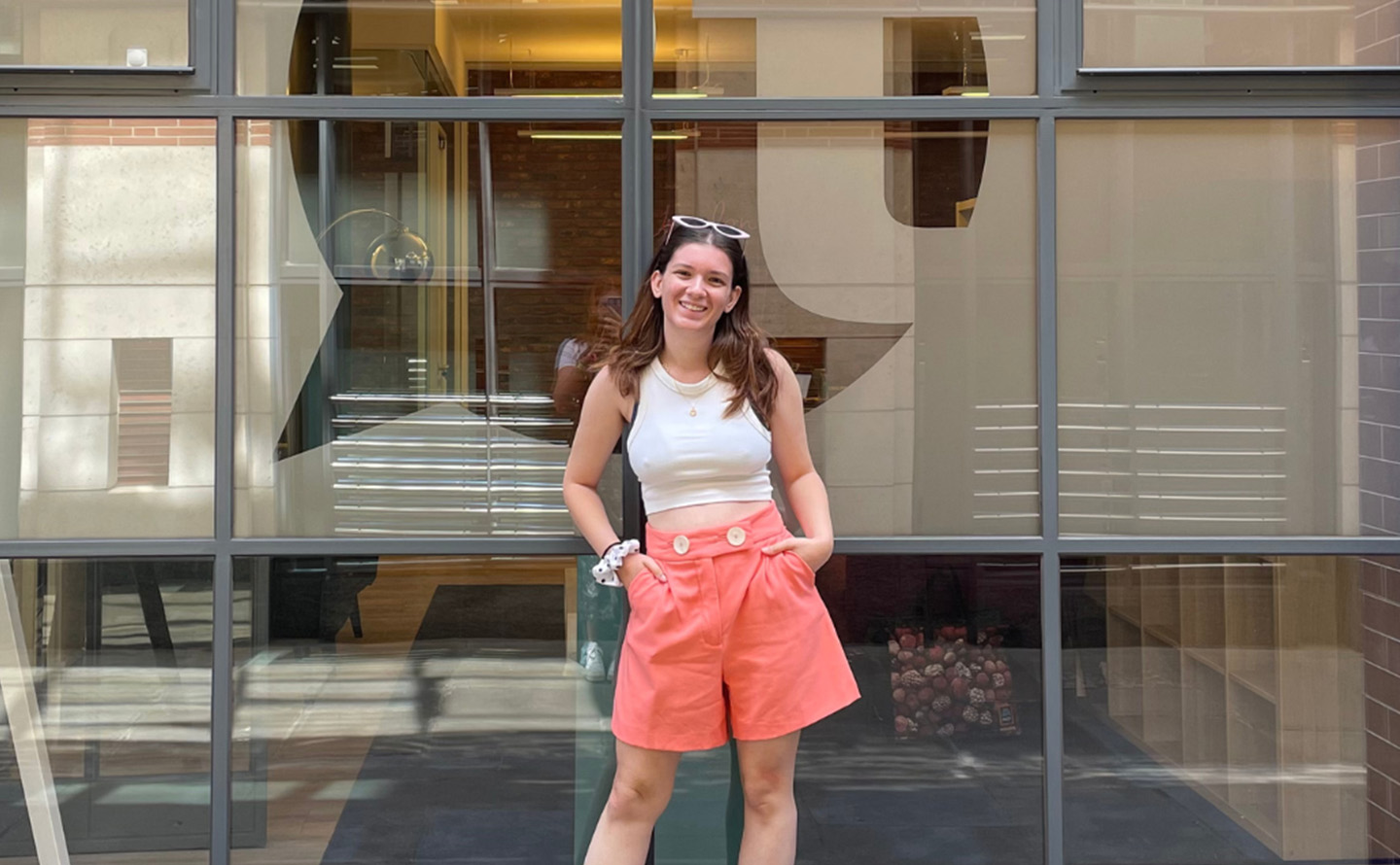BA (Hons) English Literature
Key information
-
Typical offer:
Entry requirements -
Fees: See below
Full details -
UCAS code: Q350
-
Institute code: H36
-
Study abroad option
-
Work placement option
Find out more
Why choose this course?
- 100% satisfaction for academic support (NSS, 2024, based on the average of Q15-16)
- Specialise in the literature genre and period of your choice
- Optional foreign language pathways from beginner to advanced
We give you:
- A fresh take on traditional writing and the opportunity to study contemporary works that speak directly to our everyday lives
- An expert academic team to support you and build your confidence as you develop into a literary scholar
- A flexible programme of study, allowing you to concentrate on areas you find especially interesting
- CV-building potential through work placements and extra-curricular activities
What's the course about?
Study English Literature with us and we’ll help you grow from passionate reader into critical thinker and literary scholar.
You’ll be taught by research-active academics who bring fresh thinking to our accessible, engaging courses. This means you’ll study literature written in English by writers from all parts of the globe, whose voices are relevant and important in our modern world.
We’ll introduce you to writers who will open doors to contemporary worlds and cultures remote from your own, and also help you explore more familiar literature in ways that challenge your preconceptions.
Whatever your taste in literature, our courses will interest and provoke you. From The Tiger Who Came to Tea to Jane Eyre, from Paradise Lost to Zadie Smith’s Swing Time, we’ll broaden your literary horizons and hone your critical thinking.
A core module in your first year will equip you to read and interpret both traditional and contemporary literary texts critically as a scholar of English literature. Alongside this you can choose to study international and American literature or revisit Shakespeare and consider his cultural relevance today through fictional, cinematic and TV adaptations.
In your second year you’ll focus on period-based literature from the Renaissance onwards and gain an understanding of literary history, from Elizabethan verse and drama, via Augustan poetry and the emergence of the novel in the 18th century, to the radical transformations of the Victorian age, and the emergence of modernity in the 20th century. You’ll also have the opportunity to consider ways of reading that go beyond textual analysis or historical context, such as understanding literature through the political or ideological lens of Marxism, feminism and post-colonial theory. Our English Literature students can choose a work experience module, Literature at Work, which explores English in the classroom and aspects of the literary heritage industry. The module is centred around a six-week work placement where you’ll gain valuable transferable skills. Our students have worked as school classroom assistants, in publishing houses or attractions such as London’s Charles Dickens Museum and Dr Johnson’s House.
Work placement/study abroad option: Between your second and final year, you’ll have the option to study abroad or do a work placement for up to a year. Not only will this give you an amazing experience to talk about but will also give your CV a boost. If you’d rather go straight to your final year, that’s absolutely fine too.
You’ll have the chance to specialise in your final year, tailoring your degree to reflect your own interests. Themed options include children’s literature, young adult fiction, Renaissance tragedy, 21st century American literature, European crime fiction, literary adaptations and the culture of print in the 18th century.
If you have a particular interest or independent research idea you can choose to work with a supervisor to write an extended dissertation. Previous dissertations have focused on subjects as diverse as anthropomorphism in Beatrix Potter’s animal tales; Black British identity in young adult fiction and grime music; women in Shakespearean tragedy; and slavery and the frontier in early American gothic short stories.
Your main campus is College Lane
This is where the creative arts, science and health-related subjects are based. This means you’ll share the campus with future nurses, scientists, artists and more. You can use the common rooms to relax with friends, work out in the 24-hour gym or have a drink in our on-campus pub or cafes. We also have restaurants for you to eat in or grab something on the go. Our Learning Resources Centres are open 24/7, which means you can study whenever suits you best. Want to pop over to the other campus? You can take the free shuttle bus or walk there in just 15 minutes.
What will I study?
You can also choose to study a language as part of your programme; French, German, Japanese, Mandarin Chinese, Korean and Spanish are all options. It doesn’t matter if you are a beginner or have studied before, you’ll be put in the appropriate class.
Check out our student blogs

Alumni Stories
April Wilson
Meet April Wilson, who used the diversity of her course to gain new experiences and learn. She is currently an Alumni Relations Coordinator at the University of Sussex.
Read more stories BA (Hons) English Literature with Film| Current job role | Alumni Relations Coordinator |
|---|---|
| Year of graduation | 2017 |
| Course of study | BA(Hons) English Literature with Film |
| MA Journalism with Media Communications |
University life and experience
April initially decided to go to the University of Hertfordshire due to our close proximity to London. She liked that it was easy to commute into the city for shopping and concerts, but that Hatfield wasn’t as expensive to live in!
While studying, April gained valuable experience which helped her develop essential skills for her current role which meant she was able to start ‘armed with the knowledge’ she needed.
However, the most useful thing she learnt from her postgraduate course was having confidence in herself and her ideas, especially when presenting. She credits this to ‘the support of my peers and lecturers who made me feel more confident in my abilities.'
She adds that her undergraduate degree helped her develop the writing and research skills which she applies daily to her current role and her approach to work.
Not only did April gain experience from her studies, but the extra-curricular activities she took part in also helped develop her skills. She says, ‘The writing and video editing experience I was able to gain from my time volunteering for societies at the University was also essential in helping me to have the skills that are valuable within my role.’
Future aspirations
April is also willing to try new experiences to help her gain valuable work experience in a variety of roles. She has previously, done everything from fundraising for charity to running my own online magazine.
In the future, April hopes to continues her studies and complete a PhD in Film Studies. She is particularly interested in looking at representation in films and how this is interpreted through social media.

Alumni Stories
Adelina Iacurto
Meet Adelina. Adelina was able to secure her first job whilst working as a Careers and Employment Student Ambassador at Herts.
Read more stories BA (Hons) English Literature| Current job role | Social Media Executive |
|---|---|
| Year of graduation | 2021 |
| Course of study | BA (Hons) English Literature with American Studies and Media Cultures |

Steps to success
Whilst Adelina was studying for her degree, she also worked as a Careers and Employment Student Ambassador for the Careers and Employment Service at Herts. Adelina used this as an opportunity to look for any graduate jobs that appealed to her or were a good fit for her degree. She applied for her current role as Social Media Executive at Tonic Agency in London during her final year and started soon after graduating.
She says, ‘I found my job through the University's careers service. The main interview was by video, and I felt well prepared to script, create slides for, and record a presentation for the interview because I had experienced doing similar things for my assignments.
‘Studying English Literature at Herts involved lots of writing, proofreading, and communicating with different audiences. It taught me to have a critical eye – perfect for reviewing analytics – and I became used to engaging with complex theoretical approaches. These skills have been integral to my current role working for an employer branding agency. I do a lot of copywriting and I can quickly look at a headline and understand whether it works or not.’
The role of a social media professional
So, what does Adelina’s role entail on a day-to-day basis? What does a social media executive do?
Adelina explains, ‘My role involves managing anything social media. One of my clients is Currys, and I manage their Instagram, Twitter, Facebook, and LinkedIn presence. I’m involved in briefing the content for their social media, arranging copywriting, and managing any interactions throughout the day. I also arrange paid advertising and targeted content, as well as processing analytics and noticing trends that are emerging.’
Life at Herts and understanding diversity
Adelina has fond memories of her time at Herts and loved studying for her degree. She says, ‘I really enjoyed the theoretical approaches and the impact they’ve had on how I view the world. During my degree, we looked at feminist theory and queer theory, for example, and these are ideas that I still use today. During Pride Month in June, I could explain to my clients what ‘rainbow-washing’ was, and the importance of understanding the meaning of Pride authentically and not marginalising LGBTQ+ people.’
Advice to students
As a recent graduate, Adelina’s key piece of advice to current students studying similar subjects is, ‘Don’t be put off by all the reading! You’re going to read books you dislike, so use that passion to have an answer about why you dislike that book and convince people of your reasoning. Make the people reading your assignments believe what you are saying. It’s all about being persuasive.’

